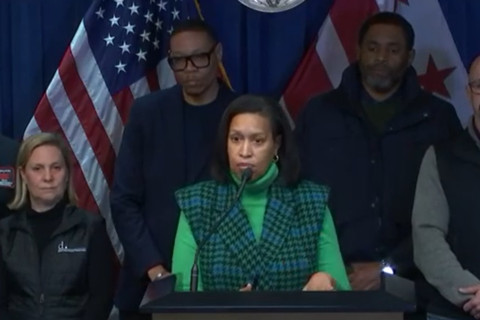The 60th anniversary of the March on Washington on Saturday in D.C. is prompting some to reflect on the progress made on core issues of the movement, especially voter rights, since the original march in 1963.
“The importance of this march is that we’re in a continuation,” Marc Morial, CEO of the National Urban League, told WTOP. “We have to fight, we have to work, we have to compel Congress to pass a new voting rights bill.”
Morial said that since the 50th anniversary of the march, there has been a “significant assault on voting rights” nationally.
“At the moment of the 50th anniversary, Barack Obama was president,” he said. “But I remember at the 50th anniversary, the Supreme Court had just struck down Section 5 of the Voting Rights Act in the Shelby [County v. Holder] case.”
Morial called this an “early warning sign” of what would happen during the Trump administration, which he said introduced legislation at the state level “simply to make it harder for Black people, Latinos, disabled Americans and students to vote.”
The former mayor of New Orleans stressed that the 60th anniversary of the original March on Washington should be focused on how “Congress could put an end to voter suppression tomorrow, by simply passing the John Lewis bill, and the Freedom to Vote bill.”
Other issues that Morial hopes the anniversary can highlight include, “the effort to ban books and to restrict the teaching of African American history.” He also said ending affirmative action could drastically reduce the number of Black students in U.S. colleges and universities.
“This is what we face. This is the reality of today,” Morial said. “What is on the line is the future of American democracy. The future of an America which is inclusive and opportunistic for all, that’s what’s on the line.”
Morial said that he has “no doubt” that progress since Martin Luther King, Jr. gave his “I Have a Dream” speech.
“Have we made the progress we would have imagined? Not really,” He said. “So there’s a tremendous amount left to do, if we’re going to become a society which is equitable.”
Equity is not present when Morial said that there are clearly “health disparities, education disparities, the differential in the unemployment rate” for Black Americans.
But he was also clear that “this march is bigger than Black America.”
He said the march is “put together by a broad coalition of multiracial organizations,” that also include LGBTQ+ people and “all religions” that will be represented this weekend.
Marches and protests are about “building and strengthening a new coalition,” said Morial, which is why he is looking to a younger generation to continue building on the message of the March on Washington.
“This is their future. This is their moment. This is their time,” he said.
WTOP’s Sandra Jones contributed to this report.








